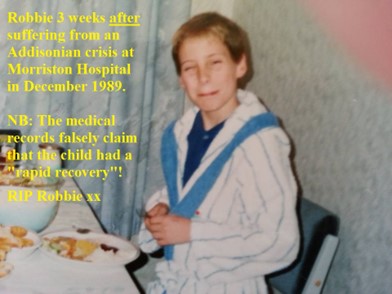Robbie Powell 2024: A Legacy of Injustice and the Road to Accountability
Injustice in Robbie Powell's Case
The tragic preventable death of 10-year-old Robbie Powell on 17th April 1990 from Addison’s disease exposes the deep cracks in the UK’s healthcare system. Addison’s disease, a condition that invariably results in death without treatment and requires prompt and specific treatment, was suspected four months before Robbie's death and the ACTH test ordered but not done. The medical professionals involved failed to act when it mattered most, resulting directly in Robbie’s death. What followed was a system that closed ranks, leaving Will and Diane Powell to fight a battle against an indifferent and obstructive establishment. This case should have led to swift accountability, but instead, it has dragged on for over three decades—a testament to the systemic resistance to owning up to fatal mistakes.
Recent developments in the quest for justice in Robbie Powell’s case underscore the ongoing challenges and emerging opportunities in addressing this enduring injustice. These updates are explored, highlighting their potential impact on the pursuit of accountability and the broader implications for systemic reform within the UK’s healthcare and legal systems.

Photo: Robbie Powell, whose tragic case has raised important questions about medical transparency and justice. Kindly provided by Will Powell.
A Glimmer of Hope and Its Demise
In 2013, a brief flicker of hope appeared when Jonathan Evans, who was Will Powell’s former MP, called for an adjournment debate in Parliament as a consequence of the untruths and misleading information that were communicated to him by the then Secretaries of State for Wales and the Crown Prosecution Service [CPS] in the 1990s. This move was intended to reignite scrutiny of Robbie Powell’s case and along with Mr Powell's submissions led to a review by the Director of Public Prosecutions (DPP). The review, which commenced on 9th October 2014, aimed to reassess whether there were grounds for pursuing prosecutions against those responsible for Robbie Powell’s death and the falsification of the child's medical records, given the considerable time that had passed since the original events.
Robbie Powell, a 10-year-old boy, had died in 1990 from Addison’s disease—a treatable condition that, if diagnosed and treated promptly, could have been managed effectively. The repeated misdiagnosis and subsequent failure to act on clear symptoms and grossly abnormal electrolyte readings had led to his tragic death. The case had previously been marked by significant delays and failures in the legal system, making this review a critical opportunity to seek justice.
However, after nine years and four months, in March 2024, counsel for the review concluded with a disappointingly familiar outcome: they found, as the CPS did in 2003, that there was sufficient evidence to prosecute, and consequently none of the doctors would face prosecution. It was decided that prosecutions for gross negligence manslaughter, forgery and perverting the course of justice were deemed unfeasible. The primary reasons were the significant lapse of time, and the inappropriate immunity granted to the doctors involved back in 1996 by Dyfed Powys Police and the CPS. This outcome underscored the difficulties of pursuing justice when years have passed, and legal protections shield those responsible from accountability.
The review’s findings also criticised the CPS for its handling of the case during the period between 1994 and 2000. At this time, there were opportunities to pursue prosecution, but the CPS's actions—or lack thereof—prevented this from happening. By September 2021, the appointed counsel for the legal review cited the passage of time as a barrier to action, reinforcing the perception that the system was more intent on protecting itself from scrutiny than in delivering justice. Counsel also acknowledged that the 2003 investigation of Mr Powell's complaints against the CPS between 1994 and 2000 were not adequately investigated. The CPS has now referred Robbie's case to the Independent Assessor of Complaints.
This sequence of events highlights a troubling pattern: institutional evasion dressed up as legal reasoning, where the focus appears to be on safeguarding the system from embarrassment rather than holding those responsible accountable.
.jpg)
Photo: Will Powell with his son Robbie. Will Powell has fought tirelessly for justice in the aftermath of Robbie's death. Kindly provided by Will Powell.
The New Phase: Institutional Resistance and the Quest for Accountability
Despite these setbacks, the campaign for justice continues, with a new development offering a potential breakthrough. In the run-up to the 2024 election, James Evans MS, a Conservative Assembly member, reached out to the Secretary of State for Wales, David T C Davies, to discuss the collapse of the Powell’s 1992 appeal—a matter that had been mishandled at the highest levels. Prior to the 2024 election, the then Conservative Secretary of State deferred addressing the issue until after the election. Following the Labour win, Will Powell contacted Jo Stevens, the new Secretary of State for Wales, who initially attempted to pass the matter off to the National Assembly for Wales.
This, of course, wasn’t just a question for devolved government. The allegations of dishonesty and corruption within the Welsh Office made this a case that required administrative-level attention. What happened at the Welsh Office in 1992 resulted in the collapse of the appeal which denied Will Powell a conclusion to the NHS complaint he made just 13 days after Robbie's death.
After persistent lobbying, Jo Stevens has now agreed to meet with Will Powell. The meeting is confirmed for 17th October 2024. Initially, 30 minutes were offered, but after further submissions, the time has been extended to 40 minutes. Will Powell will be accompanied by Dr. Michael Powers KC (a barrister at The Barrister Group, regulated by the Bar Standards Board), who has been involved in the Powells’ pursuit of justice for over 30 years and represented them at the Welsh Office Appeal; Sidney Herbert, a good friend who has played a pivotal role in supporting Will Powell; and James Evans MS. This meeting represents a rare opportunity to revisit key issues that have long been swept under the rug. However, this cautious optimism must be tempered by the knowledge that past hopes have all too often been dashed by bureaucratic inertia.
In response to the latest developments in his case, Will Powell kindly provided the following statement:
“This is the first time that a Secretary of State for Wales has agreed to meet me to discuss these events. It should be noted that when Sir Robert Behrens CBE, the former Parliamentary Ombudsman, met me at my home in 2016 and viewed the evidence he fully supported a public inquiry into Robbie's case and did so unsuccessfully for 6 years while in office.”
The Role of Modern Technology in Challenging Systemic Failures
While traditional avenues for justice have continually faltered, modern technology has allowed Robbie’s case to remain in the public consciousness. Where the courts and political figures have failed, the digital age has offered new ways to keep the pressure on. Will Powell has leveraged podcasts, interviews, and blog articles to ensure that the failures surrounding his son’s death remain at the forefront, bringing attention to a case that might otherwise have been quietly buried by those in power.
Furthermore, through platforms such as the Harm and Evidence Research Collaborate (HERC) blog post from 11th August 2021, the Radio Ombudsman podcast from 16th May 2022, the Patient Safety Learning Hub (PSL-the Hub) interview from 29th May 2024, and the Angela Walker in Conversation podcast from 12th September 2024, Will Powell has highlighted his ongoing pursuit of justice and the systemic issues that have persisted for decades.
These digital platforms have been invaluable in challenging the official narrative and ensuring that Robbie’s case remains in the public domain. The ability to expose these systemic issues outside of the traditional, and often obstructive, mechanisms of justice has been a powerful tool in maintaining pressure on those responsible.

Photo: Robbie Powell with his two brothers. Their family has been deeply affected by the events surrounding Robbie's death. The Powells' son Ian, far right, died in 2019 of alleged medical negligence. Kindly provided by Will Powell.
The Duty of Candour: Reform or Reformism?
The duty of candour, hailed as a much-needed reform, was introduced as a consequence of Robbie's parents exposing the absence of a legal duty of candour in the UK Courts and the European Court of Human Rights between 1996 and 2000. The Care Quality Commission [CQC] has acknowledged this on their website. This is enshrined in Regulation 20 of the Health and Social Care Act 2008 (Regulated Activities) Regulations. This statutory duty mandated openness and honesty when things go wrong, initially applying to NHS Trusts and later to all care providers in England. It was intended to ensure transparency and accountability, particularly in cases where healthcare errors have serious consequences. Robbie Powell’s case was pivotal in highlighting the urgent need for such a reform, and it led to what is sometimes referred to as "Robbie’s Law," which aimed to address these critical gaps in accountability.
However, the initial version of the duty of candour had significant limitations. It held organisations accountable but did not extend to individual practitioners—the frontline decision-makers. This omission meant that while institutions could issue apologies and acknowledge errors, the actual professionals responsible for mistakes were shielded from personal accountability. This gap was especially glaring in high-profile cases like Robbie's and Hillsborough, where not only systemic failures occurred but also flawed individual decisions – whether due to negligence or intentional misconduct – contributed directly to the tragic outcomes. These poor individual judgments, alongside the broader culture of denial, highlighted the urgent need for greater personal responsibility.
Hillsborough and the Call for Revisions
The Hillsborough disaster further underscored the inadequacies of the original duty of candour. It became evident that without individual accountability, systemic issues would persist unchecked. In response, a review of the duty of candour was announced by the UK government on 6th December 2023. This review aims to address these deficiencies by proposing reforms to hold individual healthcare professionals accountable for their actions. Robbie Powell’s case, associated with the push for "Robbie’s Law," played a crucial role in driving this review, as it exemplified the need for more robust mechanisms to ensure personal responsibility. While this move is a step in the right direction, progress has been slow, and significant resistance remains.
Will Powell further commented on the broader issues surrounding duty of candour in healthcare:
“The organisational duty of candour is severely flawed because healthcare professionals who suppress errors and cover up fatalities results in the NHS organisation not being in a position to admit to the mistakes that have been made, which in turn prevents lessons being learned. Furthermore, when the dishonesty of the healthcare professionals are subsequently exposed the CQC does not have the jurisdiction to take action against them. In these instances the matter would have to be referred to the General Medical Council who, back in 2008, refused to investigate Robbie's case notwithstanding they had been provided with police files setting out 35 suggested criminal charges against the doctors."

Photo: Robbie Powell, a much-loved child whose case continues to resonate. Kindly provided by Will Powell.
The proposed reforms promise to extend accountability to individual practitioners, thereby enhancing the transparency and trust that the original duty sought to foster. By making healthcare professionals directly accountable for their actions, these changes could improve patient safety and promote a culture of learning from mistakes. However, the reforms may also increase stress among healthcare staff, discourage the reporting of errors, and contribute to a culture of blame that could hinder overall improvement in the system. Balancing these outcomes will be key to ensuring that the reforms are effective without unintended consequences. The review process is expected to involve extensive consultations with various stakeholders, and as of now, there have been no substantial updates since the initial announcement. At this present time Will Powell has not been invited to give evidence to the duty of candour review.
A New Era of Accountability?
Robbie Powell’s case has become a symbol of the institutional failings that plague the UK’s healthcare and legal systems. For more than three decades, Will and Diane Powell have pursued justice, encountering obstacle after obstacle. While the proposed reforms to the duty of candour offer a glimmer of hope, they are no panacea. Extending accountability to individual healthcare professionals is a step forward, but it must be accompanied by a broader shift in institutional culture—a shift that prioritises transparency and responsibility over protecting reputations.
The upcoming meeting with Jo Stevens, the current Secretary of State for Wales, presents a crucial opportunity to revisit Robbie’s case and address the issues surrounding the 1992 Welsh Office appeal. If handled correctly, it could open doors to further investigations and even a comprehensive public inquiry. However, history teaches us that institutional change is rarely swift or straightforward, and the path to justice for Robbie Powell remains fraught with challenges.
In the end, the fight for justice in Robbie Powell’s case is emblematic of a larger struggle. The proposed reforms to the duty of candour may help address some of the systemic issues that have allowed this injustice to fester for so long. But real progress will depend on how these reforms are applied and whether the system can finally break free from the inertia that has allowed negligence and cover-ups to persist for decades.
If you would like to find out more about Robbie’s injustice or keep up to date with how this is unfolding, please visit:
If you are interested in reading more about this injustice, Sharon Hartles has published a comprehensive article on the Harm and Evidence Research Collaborative blog that may be of interest: Robbie Powell: Time for Truth, Justice and Accountability
https://www5.open.ac.uk/research-centres/herc/blog/robbie-powell-time-truth-justice-and-accountability
Sharon Hartles, Member of the Harm and Evidence Research Collaborative, The Open University. Member of the British Society of Criminology. Affiliated with the Risky Hormones research project (an international collaboration in partnership with patient groups). Contact: sh28739@ou.ac.uk
